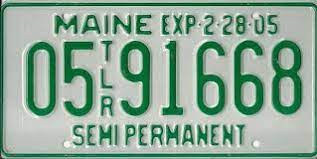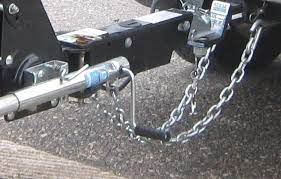Maine Trailer Laws and Regulations
If you often find yourself towing heavy loads around your state you probably have some idea of the state laws and rules that apply to do this. Some people may not be aware however that sometimes laws can differ state by state. This can mean you might be legal in one state but crossing the border you might well get pulled over for an infringement you were not expecting.
In this article we are going to look at the laws for Maine which may vary from the state you might be driving in from. There may also be regulations you were not aware of as a native to the state which might catch you out. So read on and let us try to keep you from costly tickets.
Do Trailers Need to Be Registered in Maine?
In the state of Maine people with camper or tent trailers have to ensure that they renew their registration on the units within 60 days of expiration to avoid excise taxes. This is easily done online at the Vehicle Registration Service.

What about titles? Well in Maine if your trailer was made in 1994 or earlier and weighs less than 3,000 lbs. unloaded then you do not require a title. However if the trailer is from 1995 or later and weighs over 3,001 lbs. unloaded you will need a title.
Maine General Towing Laws
These are general rules in Maine regarding towing that you might come foul of if you were not aware of them. Sometimes you may get away with an infringement of these rules because you did not know them but you can not assume this will be the case.
- You can only tow one trailer or semi trailer at a time in Maine using a motor vehicle unless said vehicle is a truck tractor and then only on the interstate highway system.
- You can only tow one boat at a time behind your passenger vehicle and the total length of both tow vehicle and boat can not exceed 65 feet.
- It is against the law to ride in any trailer that is being actively towed.
Maine Trailer Dimension Rules
It is important to know the state laws governing the sizes of loads and trailers. You may need permits for some loads while others may not be allowed on certain types of roads.
- You can not ride in or live in a trailer while it is being towed along public roads in the state.
- The total length of tow vehicle and trailer can not exceed 65 ft.
- The maximum length of the trailer is 48 ft.
- The maximum width for a trailer is 102 inches.
- The maximum height of a trailer and load is 13ft 6” ft.
Maine Trailer Hitch and Signal Laws
There are laws in Maine that relate to the trailer hitch and safety signals displayed by the trailer. It is important to be aware of these laws as they are safety based so may carry potentially large fines.
Safety chains and steel cables used for towing must be made of wire that is at least ¼ inch in thickness.

Maine Trailer Lighting Laws
When you are towing something that will obscure the rear lights of your tow vehicle it is important to be able to communicate your upcoming and present actions in the form of lights. This is why there are rules regarding trailer lighting.
- Trailers that are 7ft wide or wider require all rear lights, reflectors and signal lights to be affixed within 12 inches of the vehicle's edge. If the lights have been installed as part of the manufacture of the trailer this rule does not count.
- All trailers that are wider than the tow vehicle must have reflective materials or lamps on each front corner so as to be visible to drivers coming in the opposite direction.
Maine Speed Limits
When it comes to speed limits this varies and depends on the posted speeds of the specific area. You obviously should not exceed the posted speed limit in any area. When it comes to normal towing there are no specific different limits but it is expected that the speed is kept at a sensible level.
If your trailer is being caused to sway or lose control due to speed you may be pulled over even if you are within the posted limits. This is because the trailer may be posing a threat to public safety and you will be asked to slow down.
Maine Trailer Mirror Laws
The rules for mirrors in Maine are not specified although they are likely required and you may be pulled over if you do not have any or they are unusable. If your view is compromised by the width of your load you may want to consider extensions to your existing mirrors. These can be in the form of mirror extenders that slot into already existing wing mirrors.

In Maine the law states that no person may operate a vehicle if the driver cannot have an unobstructed view of what is behind them unless there is a mirror or reflector. This mirror or reflector must supply a view of at least 200 ft behind them.
Maine Brake Laws
The brakes on your tow vehicle and potentially on your trailer are important to the safety of any towing operation. Ensure that they meet state guidelines and adhere to the stated rules for use on the road with a trailer.
Trailers weighing under 3,000 lbs. do not require brakes
Trailers over 3,000 lbs. are required to have brakes on all wheels.
Conclusion
There are a number of laws in Maine that pertain to towing and trailers which are designed to keep the roads and road users safe. The state of Maine older trailers under 3,000 lbs. do not require a title while heavier ones that are more modern do.
Link To or Reference This Page
We spend a lot of time collecting, cleaning, merging, and formatting the data that is shown on the site to be as useful to you as possible.
If you found the data or information on this page useful in your research, please use the tool below to properly cite or reference Tow Ratings as the source. We appreciate your support!
-
<a href="http://towratings.net/blog/maine-trailer-laws-and-regulations/">Maine Trailer Laws and Regulations</a>
-
"Maine Trailer Laws and Regulations". Tow Ratings. Accessed on April 16, 2024. http://towratings.net/blog/maine-trailer-laws-and-regulations/.
-
"Maine Trailer Laws and Regulations". Tow Ratings, http://towratings.net/blog/maine-trailer-laws-and-regulations/. Accessed 16 April, 2024
-
Maine Trailer Laws and Regulations. Tow Ratings. Retrieved from http://towratings.net/blog/maine-trailer-laws-and-regulations/.